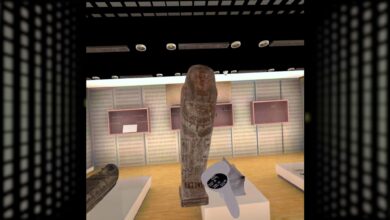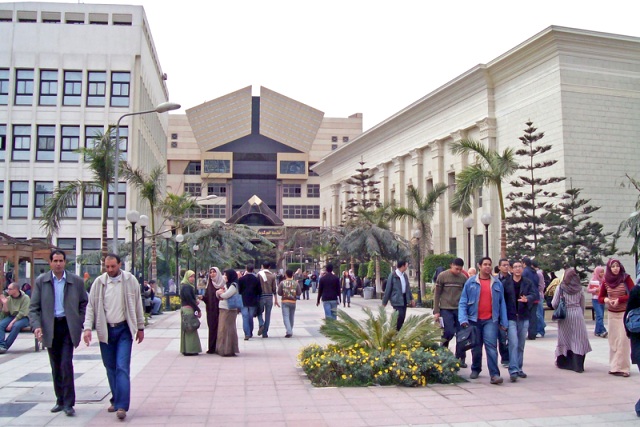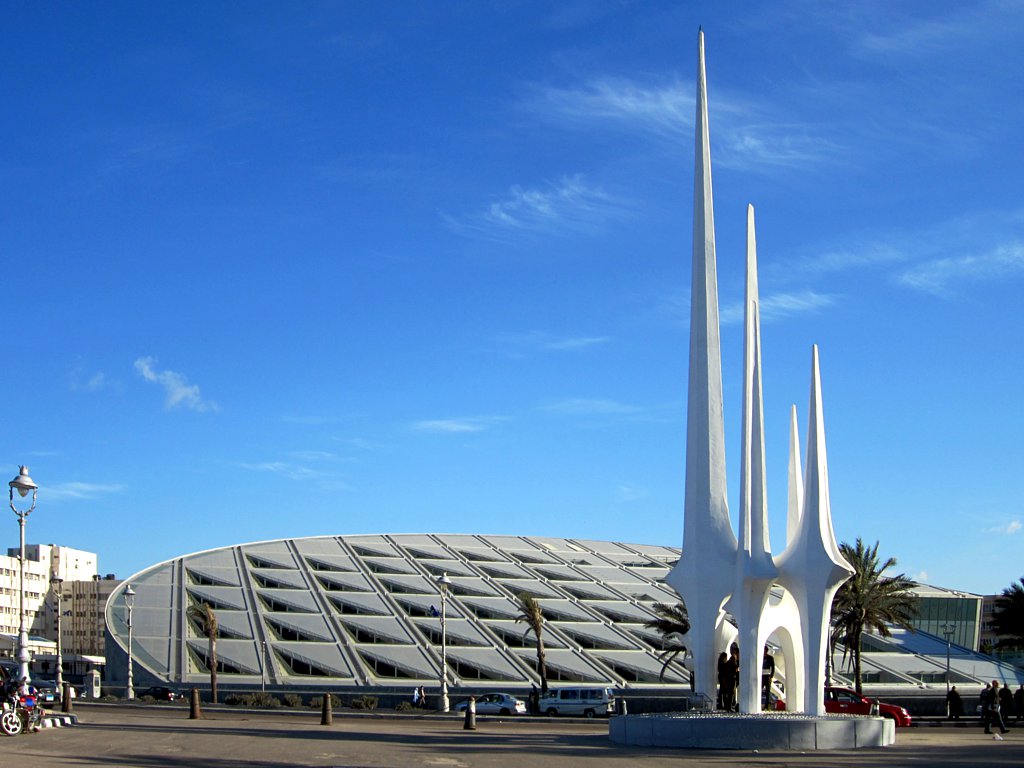The Bibliotheca Alexandrina is an ambitious project with a vast cornucopia of programs and resources. It was founded as a library with space for 8 million books, but it also functions as an all-purpose cultural center, conference venue and planetarium, as well as a complex of art galleries and museums.
Its priorities have been the subject of some debate, as many of the institution’s high profile activities are not connected to its function as a library.
“The bibliotheca doesn’t sell itself to the public as a library. It rather publicizes its conferences and activities,” explains Khaled Fahmy, chair of the American University in Cairo’s history department.
“Those of us familiar with the role of a public library are surprised to find out that reading and research are not the main functions of the bibliotheca. It’s more of a meeting point for intellectuals,” he adds.
The bibliotheca’s management, however, envision the place to be “much more than a library – it is a cultural center,” as advisor to the director Aly Maher explains.
Big plans, and some hurdles
Nearly ten years since it opened its doors to the public, the library at the bibliotheca is still under development. It is still not recognized as a major research destination for scholars in Egypt.
“Scholars tend to think of the library as a tourist attraction and not a resource,” says Fahmy.
But while it is indeed one of Alexandria’s major tourist attractions, it also serves the local community as both a public and a research library. The library's main users are students from Alexandria University, located across the street, and school children.
“We’re a public library and research library,” says Lamia Abdel Fattah, acting chief librarian for the Library Sector of the bibliotheca, who hopes that eventually the collection will attract all scholars researching the city of Alexandria, as well as the ancient library of Alexandria – which the bibliotheca seeks to resurrect.
But the library is still acquiring the core of its collection. “While doing research on the city of Alexandria, I found myself missing a couple of books. So I went to see what the bibliotheca had in that field, and what I found was a very small collection,” Fahmy says.
At 500,000 books, the collection is currently equivalent to that of a small university library. The official collection development policy states that because of “limited budgeting and staff” its current acquisitions are temporarily limited to “Basic and Minimal collecting levels.”
Sahar Dourgham, a professor at the fine arts faculty at Alexandria University, felt that the library’s collections were not specialized enough to meet her research needs, “The library is full of books from many places and many branches, but I do not feel its collection serves those doing in-depth research.” She didn’t use the library for her graduate research: “I always brought the books I needed from abroad.”
The bibliotheca is also challenged to create an expansive collection of books in Arabic. “People want all the materials in Arabic, but sometimes very specialized publications are not available in Arabic. We supplement it in English and in French,” says Abdel Fattah.
If the book collection is small, one area where there’s been aggressive expansion at the bibliotheca is digital resources.
“A Digital Library for the Twenty-First Century”
Alexandria University students heavily rely on the bibliotheca’s e-resources. “We have access to databases about medicine, music and much more. This is the area that most students and researchers come here for,” Abdel Fattah explains.
It subscribes to 60,000 electronic journals and its collection includes 180,000 electronic books, according to Noha Adly, deputy head of Information and Communication Technology.
It has two main digital book initiatives that strive to create a complete and accessible store of the world’s knowledge on the internet. The Universal Digital Library is a collaboration with Carnegie Mellon University, and the World Digital Library with the Library of Congress. Both projects are in early stages, but the bibliotheca’s involvement places it at the forefront of this field.
It is also supplementing its archival material digitally, with collections documenting Egypt’s modern history, including the ongoing revolution.
All these resources are available online through the bibliotheca’s website.
In addition to being a center for digitization, it also attracts researchers who need DVDs. “My colleagues researching television and film totally rely on the bibliotheca for their work,” Dourgham explains.
Still, some of the bibliotheca’s high-profile projects involve impressive machines that are still finding their use.
The Espresso Book Machine is an instantaneous book printer on display at the library. It is a formidable piece of machinery, but is not yet in use. Plans are in place for it to be used to reproduce rare books and manuscripts, and deliver books on order. But, as Adly explains, “We currently have permission to print only 1,000 books from our collection. That’s not enough to start using the machine.”
The library also holds one of the world's two copies of the Internet Archive, which stores some 10 billion webpages dating back to 1996. A vast mass of blinking hard drives, the archive is displayed at the bibliotheca, and is accessible through the library’s website.
The physical copy of the internet archive is a sight to see. It’s a kind of emblem of the bibliotheca’s vision to be a leader in digital information technology and a cutting edge library.
But such ambitious and diffuse projects may distract attention and funding from the library’s basic needs.
Building a library from scratch
A library cannot be built overnight. As with many elements of the bibliotheca, the stated goal to acquire 1 million manuscripts is ambitious and will take years to achieve. While its current store of 190,000 manuscripts and rare books is impressive and accessible, it is dwarfed by the collection of Egypt’s National Archives, despite the bureaucracy of the latter.
Fashioning itself as a hub for digital information technology, the bibliotheca has been successful. But it’s potential to become an open, accessible, well-funded public library – something that doesn’t exist in Egypt – remains contentious. This is a goal that its librarians are working toward, but it can sometimes disappear amid its mass of programs.




